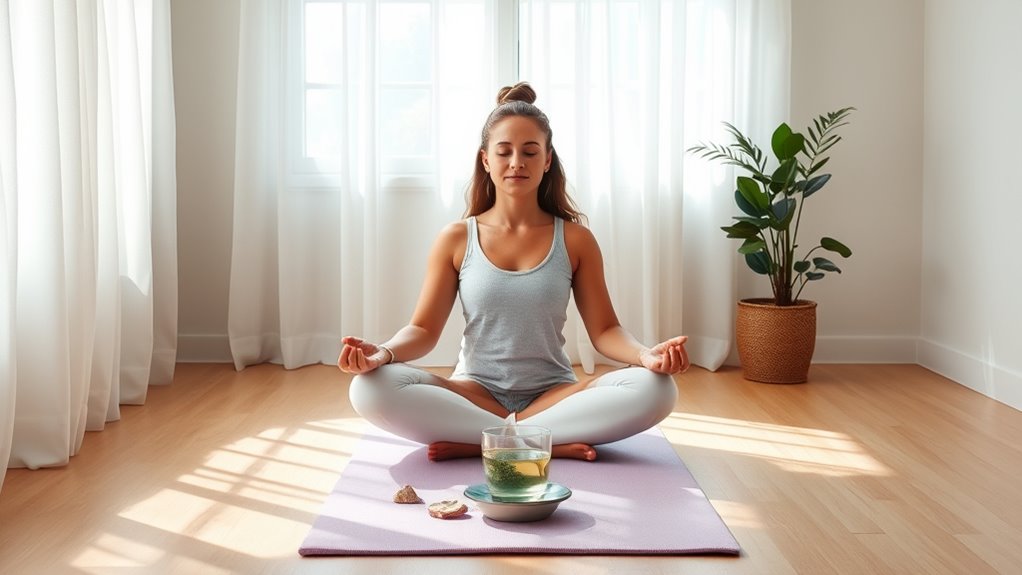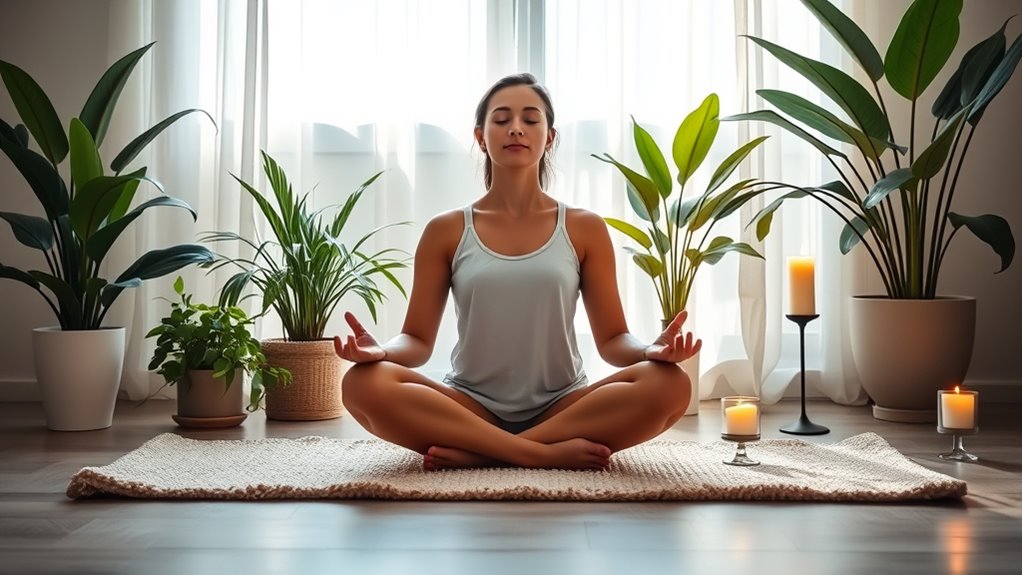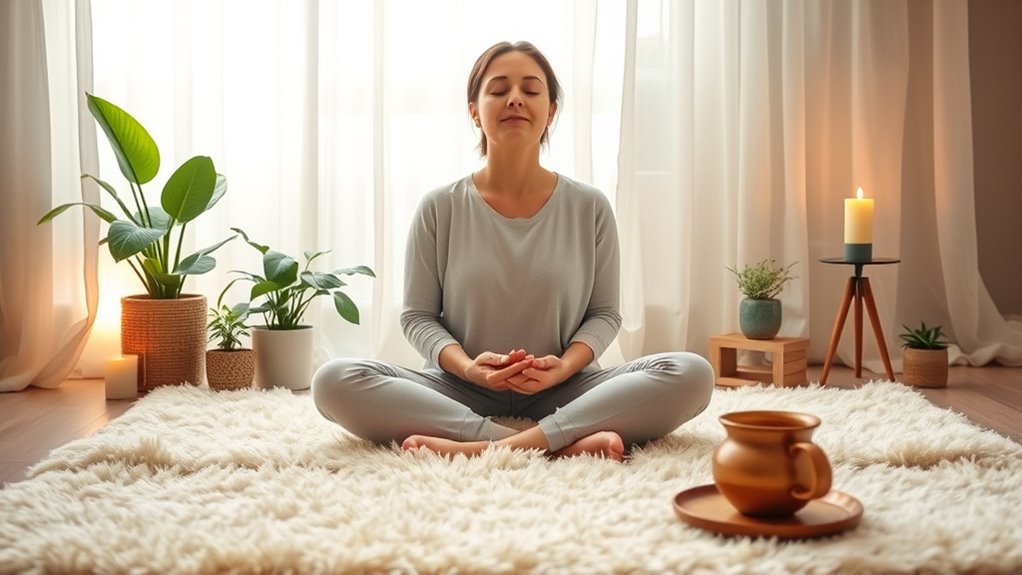Self-care goes far beyond quick fixes like bubble baths; it’s about intentionally nurturing your whole self—mind, body, and emotions—through personalized routines, healthy boundaries, mindful awareness, and meaningful activities. It involves setting limits to protect your energy, practicing self-reflection, and engaging in pursuits that boost resilience and purpose. True self-care helps you create sustainable habits that support long-term well-being. If you want to explore how to develop a deeper, more effective self-care practice, keep exploring further.
Key Takeaways
- True self-care involves nurturing mental, emotional, and physical well-being through intentional, personalized routines.
- It emphasizes setting boundaries and seeking support to maintain emotional resilience and prevent burnout.
- Self-care includes mindfulness practices that foster presence, emotional awareness, and self-reflection.
- Developing sustainable routines tailored to individual needs promotes long-term health and fulfillment.
- Beyond superficial activities, self-care is about aligning actions with personal values and fostering meaningful growth.
Recognizing the Depth of Self-Care

While bubble baths and spa days are popular ways to relax, true self-care goes much deeper. It’s about understanding that caring for yourself involves addressing your whole being—mind, body, and emotions. Recognizing the depth of self-care means acknowledging your needs beyond surface-level comforts. It’s about making intentional choices that promote long-term well-being, such as setting boundaries, practicing self-awareness, and prioritizing your health. Self-care isn’t a one-time act but a continuous process of nurturing yourself in meaningful ways. When you see self-care as more than just indulgence, you start to value routines that support your resilience and growth. Incorporating emotional and frequency impact can deepen your understanding of holistic well-being. This profound understanding helps you build a foundation for genuine wellness, where caring for yourself becomes a essential part of your everyday life.
Nurturing Your Mental and Emotional Well-Being

Taking deliberate steps to nurture your mental and emotional well-being is essential for maintaining overall health. You can start by setting boundaries that protect your energy and prioritize what truly matters. Practice mindfulness or meditation daily to stay grounded and manage stress effectively. Reach out to trusted friends or family when you need support—sharing your feelings helps lighten emotional burdens. Avoid suppressing emotions; instead, acknowledge and process them through journaling or therapy. Engage in activities that bring you joy and foster a sense of purpose, whether it’s a hobby, volunteering, or learning something new. Recognizing the importance of father and daughter bond in your environment can also support a calming and harmonious space. Creating a balanced environment has been shown to significantly improve emotional well-being. audience engagement is vital for creating a supportive environment that encourages open communication and shared understanding. Remember, caring for your mental and emotional health isn’t a one-time effort but a daily commitment that empowers you to navigate life’s challenges with resilience.
Building Resilience Through Consistent Practices

Building resilience is a proactive process that relies on consistent practices to strengthen your ability to handle life’s ups and downs. By establishing daily routines, you create a stable foundation that supports emotional recovery and adaptability. Regularly practicing self-reflection helps you identify your triggers and develop healthier responses. Prioritizing sleep, exercise, and nutrition boosts your physical resilience, making it easier to face stress. Developing a growth mindset encourages you to view setbacks as opportunities for learning. Incorporating mental clarity and health practices, such as meditation, can further enhance your resilience. Meditation not only calms the mind but also enhances cognitive function and emotional regulation, which are essential for resilience. Consistency is key; small, intentional actions over time build mental toughness and confidence. Being aware of your emotions and feelings during challenging times can enhance your resilience. Engaging in community bonding and social support also plays a vital role in strengthening your coping skills. As you commit to these practices, you’ll notice increased capacity to bounce back from challenges and maintain a sense of balance amid chaos. Building resilience isn’t a one-time effort—it’s an ongoing journey of dedication.
Cultivating Mindfulness and Presence

Practicing mindfulness and presence involves intentionally anchoring yourself in the current moment, allowing you to fully experience your thoughts, feelings, and surroundings without judgment. You can start by taking slow, deep breaths, paying attention to each inhale and exhale. Notice the sensations around you—the sounds, smells, textures, and sights—without trying to change or analyze them. When your mind wanders, gently bring your focus back to the present. This habit helps reduce stress, improve emotional regulation, and increase overall awareness. Incorporating short mindfulness exercises into your daily routine—like mindful eating or walking—can markedly enhance your sense of calm and clarity. Engaging in mindfulness techniques such as visualization or sound meditation can deepen your practice and foster a greater sense of tranquility. Additionally, understanding the importance of industry trends like mindfulness-based stress reduction can help you stay motivated. Recognizing how Cultural Intelligence can influence your approach to self-care and interpersonal relationships encourages a more holistic perspective. Staying informed about AI security advancements enables you to recognize how technology can support your well-being and safety. Exploring modern wellness practices rooted in tradition can also enrich your understanding of holistic self-care. Over time, cultivating presence becomes second nature, empowering you to navigate life with greater ease and compassion.
Setting Healthy Boundaries for Self-Preservation

Setting healthy boundaries is essential for protecting your energy and maintaining your well-being. When you clearly define what’s acceptable, you prevent burnout and emotional exhaustion. Boundaries help you prioritize your needs, reduce stress, and foster healthier relationships. Think of boundaries as a safeguard, not a barrier, that allows you to say no without guilt and yes to what truly matters.
| Boundary Type | Example |
|---|---|
| Emotional Boundaries | Avoiding emotionally draining conversations |
| Time Boundaries | Setting limits on work hours |
| Physical Boundaries | Respecting personal space |
| Digital Boundaries | Limiting social media use |
Prioritizing Rest and Sleep as Foundations of Health

After establishing healthy boundaries, prioritizing rest and sleep becomes a pivotal step in supporting your overall well-being. Sleep isn’t just downtime; it’s essential for your physical health, mental clarity, and emotional resilience. When you consistently get enough quality sleep, your immune system strengthens, stress levels decrease, and your mood stabilizes. To make rest a priority, create a relaxing bedtime routine, limit screen time before bed, and set a regular sleep schedule. Avoid sacrificing sleep for work or entertainment, as this undermines your health in the long run. Recognizing that rest isn’t a luxury—it’s a fundamental foundation for thriving, and understanding the science behind sound healing science can inspire mindfulness practices that promote better sleep. Sleep quality can also be influenced by your personality traits, which affect how easily you relax and unwind at night. Additionally, incorporating water-based relaxation techniques, such as listening to calming water sounds, can enhance your ability to fall asleep more peacefully. Engaging in exfoliation and skincare routines with ingredients like glycolic acid can improve skin health and confidence, further supporting your overall sense of well-being. Moreover, incorporating nutrient-rich ingredients from juice cleanses can help replenish essential vitamins that support restful sleep and overall vitality. When you honor your sleep needs, you’re investing in a healthier, more balanced life.
Engaging in Purposeful Activities

When you choose activities that reflect your core values, you create a sense of fulfillment and direction. Engaging in tasks that promote personal growth keeps you motivated and resilient. By practicing mindful engagement, you stay present, making your efforts more meaningful and enriching. Incorporating elements that support your personal growth can further enhance your sense of well-being.
Align Activities With Values
Have you ever wondered why some activities leave you feeling more fulfilled than others? It’s often because they align with your core values. When your actions reflect what truly matters to you, they create a sense of purpose and authenticity. For example, if you value kindness, volunteering or helping others will feel more meaningful. Instead of just filling time, choose activities that resonate with your beliefs and priorities. This alignment boosts your motivation and satisfaction, making self-care more than just a routine—it’s a reflection of who you are. When you engage in purposeful activities, you nurture your well-being from the inside out, fostering a deeper sense of fulfillment and balance in your life.
Cultivate Personal Growth
Engaging in purposeful activities fuels your personal growth and helps you develop new skills, insights, and resilience. When you pursue activities that align with your passions or goals, you challenge yourself and expand your capabilities. Whether it’s volunteering, learning a new language, or working on a creative project, these endeavors push you beyond your comfort zone. They also provide a sense of achievement and direction, reinforcing your confidence. Regularly dedicating time to meaningful pursuits keeps your mind active and focused, fostering a deeper understanding of yourself. You build resilience by overcoming obstacles along the way, making you better equipped to handle life’s challenges. Ultimately, engaging in purposeful activities creates a fulfilling cycle of growth that enriches your overall well-being.
Foster Mindful Engagement
Building on your commitment to personal growth, fostering mindful engagement involves deliberately choosing activities that keep you present and connected. Instead of multitasking or rushing through chores, focus fully on what you’re doing. Whether it’s cooking, walking, or journaling, immerse yourself in the experience. Notice the sights, sounds, and sensations around you. This intentional focus helps reduce stress and increases your sense of fulfillment. Engage in activities that align with your values or spark curiosity, making each moment meaningful. Avoid distractions like screens or interruptions; instead, carve out quiet time for reflection. Over time, this practice trains your mind to stay rooted in the present, enhancing your overall well-being and resilience. Mindful engagement transforms routine moments into opportunities for connection and self-awareness.
Developing Supportive Relationships

Building trust and setting boundaries are essential for healthy relationships, ensuring you feel safe and respected. You can improve connections by practicing clear, honest communication and listening actively. When you offer and receive support, it strengthens bonds and creates a foundation for mutual care.
Building Trust and Boundaries
Establishing trust and setting clear boundaries are essential steps in developing supportive relationships that nourish your well-being. Trust creates a safe space where you feel comfortable sharing your thoughts and feelings without fear of judgment. To build trust, be consistent, honest, and reliable in your actions. Boundaries define what’s acceptable and protect your emotional energy, preventing burnout and resentment. Communicate your needs openly, and respect others’ limits as well. Remember, boundaries aren’t about pushing people away; they’re about safeguarding your mental health. By clearly expressing your limits and honoring others’, you foster mutual respect and understanding. This foundation of trust and boundaries strengthens your relationships, making them more supportive, meaningful, and aligned with your self-care journey.
Effective Communication Strategies
Once you’ve set clear boundaries and built trust, communicating effectively becomes the key to maintaining and strengthening your relationships. Clear communication helps avoid misunderstandings and fosters a supportive environment. Focus on these strategies:
- Active Listening: Give your full attention, nod, and paraphrase to show understanding.
- Use “I” Statements: Express your feelings without blame, like “I feel…” to promote openness.
- Be Honest and Respectful: Share your thoughts honestly while respecting others’ perspectives.
- Ask Open-Ended Questions: Encourage dialogue by inviting detailed responses, such as “How do you feel about…?”
These methods create a safe space, deepen connections, and ensure your relationships remain supportive and nurturing.
Offering Mutual Support
Have you ever noticed how mutual support strengthens the foundation of any relationship? When you offer genuine help and listen without judgment, you create trust and deepen your connection. Supporting others means being present in both good times and bad, sharing their burdens and celebrating their successes. It’s about showing empathy and understanding, not fixing problems or offering unsolicited advice. By giving your time and attention, you foster a sense of safety and belonging. Remember, mutual support isn’t one-sided; it’s a reciprocal process where both parties feel valued and cared for. This exchange nurtures emotional resilience and promotes healthy boundaries. Developing supportive relationships takes intentional effort, but the reward is a network of genuine care that sustains you through life’s ups and downs.
Incorporating Self-Reflection and Journaling

Incorporating self-reflection and journaling into your routine can deepen your understanding of yourself and clarify your goals. When you take time to write, you create space to process emotions, track progress, and identify patterns. To make this effective, consider these practices:
- Dedicate a specific time each day, like morning or evening, to write without distractions.
- Use prompts to guide your thoughts, such as “What am I grateful for today?” or “What challenges did I face?”
- Be honest and non-judgmental—your journal is a safe space for genuine expression.
- Review past entries periodically to notice growth or recurring themes, helping you adjust your self-care approach.
This habit fosters awareness and empowers you to make intentional choices for your well-being.
Creating a Personalized Self-Care Routine

Creating a personalized self-care routine starts with understanding what genuinely nurtures your mind, body, and soul. Think about activities that leave you feeling refreshed, balanced, and fulfilled. Do you thrive with physical movement, quiet reflection, or creative expression? Identify those practices and consider how to incorporate them consistently into your schedule. Remember, self-care isn’t one-size-fits-all; it’s tailored to your needs. Start small—perhaps a morning walk, meditation, or reading time—and gradually build on what works best. Pay attention to your energy levels and emotional responses, adjusting your routine as needed. The key is to create a sustainable plan that supports your well-being without feeling burdensome. Your routine should evolve as you discover new sources of joy and relaxation.
Frequently Asked Questions
How Can I Identify Which Self-Care Practices Truly Resonate With Me?
To identify which self-care practices truly resonate with you, start by paying attention to how each activity makes you feel afterward. Do you feel more energized, relaxed, or balanced? Experiment with different methods like meditation, exercise, or creative hobbies, and note which ones bring genuine joy and relief. Trust your instincts and prioritize activities that nourish your mind, body, and soul, creating a sustainable self-care routine.
What Are Practical Steps to Maintain Self-Care During Stressful Periods?
During stressful times, your self-care can feel like an uphill climb of Everest, but small practical steps make a difference. Schedule brief breaks, breathe deeply, and prioritize sleep. Limit social media and set boundaries to protect your energy. Keep a gratitude journal or do quick stretches to stay grounded. Remember, even tiny acts can be powerful—think of them as your secret weapons to stay resilient and centered amidst chaos.
How Do Cultural Differences Influence Self-Care Approaches?
Cultural differences shape how you approach self-care by influencing what activities feel meaningful and appropriate. For example, some cultures prioritize community and social connections, while others focus on individual reflection. You might find comfort in family gatherings or spiritual practices, depending on your background. Recognizing these cultural influences helps you develop a personalized self-care routine that respects your values and promotes well-being across diverse contexts.
Can Self-Care Improve My Relationships With Others?
Yes, self-care can profoundly improve your relationships with others. When you prioritize your well-being, you become more patient, empathetic, and emotionally available. Taking time for yourself helps reduce stress and burnout, so you’re better equipped to communicate openly and listen actively. By nurturing your own needs, you create healthier boundaries and foster genuine connections, leading to stronger, more meaningful relationships with those around you.
What Are Signs I Might Be Neglecting My Self-Care Needs?
You might be neglecting your self-care needs if you often feel exhausted, irritable, or overwhelmed. Notice if you’re skipping meals, losing sleep, or avoiding activities that bring you joy. When you ignore your mental or physical health, it shows in your mood and energy levels. Pay attention to these signs, and prioritize taking time for yourself to recharge—self-care isn’t just indulgence, it’s essential for your well-being.
Conclusion
Remember, self-care goes beyond quick fixes—it’s about nurturing your mental, emotional, and physical well-being daily. Studies show that people who practice consistent self-care report 30% higher happiness levels. By setting boundaries, engaging in meaningful activities, and reflecting regularly, you build resilience and foster true well-being. Embrace these habits to create a personalized routine that supports your growth—because caring for yourself is the foundation for a balanced, fulfilling life.









